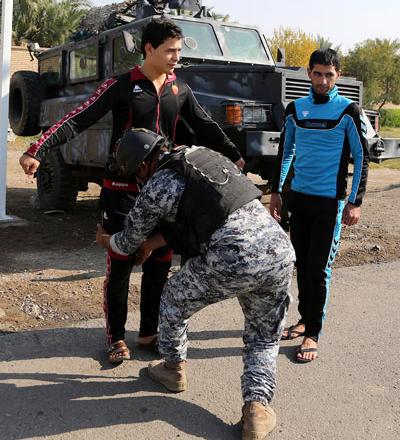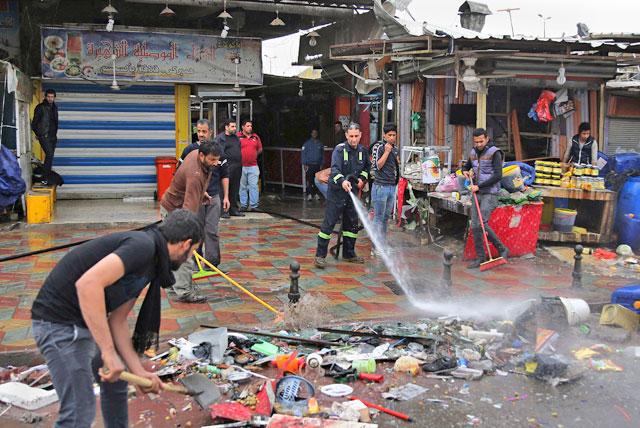You are here
Iraq to overhaul Baghdad security to stop bombings
By AP - Nov 26,2014 - Last updated at Nov 26,2014

BAGHDAD — Baghdad's neighbourhood of Gorayaat, a small Shiite enclave on a bend in the Tigris River, exemplifies the failures of Iraq's security agencies trying to protect the capital from attacks by the Islamic State (IS). The district has been a target for years, hit by so many bombings, suicide attacks, rockets and mortars that residents have lost count.
After a car bomb ripped through its main commercial street earlier this month, killing 15 people and wounding 42, security forces responded as they have after every previous attack. Soldiers and police swarmed in to secure Gorayaat's streets. At checkpoints, they checked people's IDs, and anyone who was not a resident had to account for his presence.
"That goes on for one or two days, then it's back to normal and we wait for the next bombing," said Idris Jawad, a resident.
For months, IS group militants have hammered Baghdad with bombings and suicide attacks, the work of dozens of cells operating in the Iraqi capital, officials say. Security agencies have floundered trying to stop them, relying on techniques that haven't changed — or succeeded — in a decade.
The government is now trying to revamp security measures, moving away from reliance on concrete blast walls and police checkpoints. Instead, the plan is to beef up police intelligence units that have gone understaffed and underfunded since the 2003 fall of Saddam Hussein, according to intelligence and interior ministry officials.
Among the ideas being considered is to significantly increase the recruitment of informers among the public to report on suspicious behaviour, the ministry official told The Associated Press.
That would mean recruiting Sunnis, something that has been difficult in the past. Sunnis deeply distrust the Shiite-dominated security forces, which they often accuse of discriminating against their co-religionists. Moreover, the security forces are known to be infiltrated by both Sunni and Shiite militants, meaning that anyone who cooperates with authorities against militants risks being exposed.
The interior ministry official and two intelligence officials spoke on condition of anonymity because they are not authorised to discuss the steps under discussion.
Interior ministry spokesman Maan Saad said a large shipment of new, US-made bomb-detection equipment is arriving soon in Iraq. "It will be very useful and effective in minimising the terrorist threats against Iraqis," he said, refusing to give details of the technology or the cost.
Iraqi forces are battling IS, struggling to push them back from the vast swaths of territory they captured in the summer. While the extremist fighters hold territory on Baghdad's doorstep, they are seen as unable to overrun the capital as they did Iraq's Sunni-majority areas.
But they have proven able to infiltrate with relative ease. More than 3,000 people have been killed and twice that number wounded in attacks in Baghdad in the first 10 months of 2014 alone, according to UN figures. The bombings that rip through neighbourhoods keep the city in fear, which pro-governmental media have tried to tamp down by avoiding reporting on attacks. State TV airs little besides propaganda designed to lift Iraqis' morale and build trust in the military and police.
While demoralising Baghdadi residents, the attacks build morale among the extremists at a time when the group has lost some of the aura of invincibility it gained over the summer. Instructions sent to IS group operatives in the capital and intercepted by the main intelligence agency said bombings must continue at any cost, even if the targets are not always high value, the two intelligence officials said.
The capital has seen constant violence since the 2003 ouster of Saddam — and in even times when the bombings eased, they never completely went away.
This month, Prime Minister Haider Al Abadi met with Baghdad's top military and police officials and announced a security approach. In a first step, he said he plans to place security responsibilities for Baghdad entirely in the hands of the interior ministry, which is in charge of police, and redeploy army units outside the city. The military has been seen as ill-trained for policing duties.
Abadi also intends to remove some of the blast walls that have given Baghdad the look of a city under siege ever since Saddam's ouster. Hundreds of checkpoints and kilometres and kilometres of high concrete barriers surround many neighborhoods. The grey, 6-metre-high barriers also shield government offices, banks, hospitals and police stations.
But the barriers and checkpoints only harden the city's sectarian divisions and never stopped bombings.
"We plan to remove the barriers and reopen the streets, because many of them are blocked off without any security benefit," Abadi told the meeting.
At the same time, the government aims to increase its intelligence capabilities. The campaign of bombings has exposed the agencies' "intelligence and technical shortcomings in detecting bombs and uncovering Daesh networks in the city", said one of the two officials, using the Arabic acronym for the IS.
Most IS cells are believed to be largely operating in the fringes of Baghdad, the official said. To minimise chances of detection, they assemble car bombs in or near the neighbourhood they intend to strike, he said.
Another intelligence official gave a rough estimate of "dozens" of IS cells in the capital, though he said it was impossible to know for certain. He said the group continues to infiltrate Baghdad by sending operatives among displaced Iraqis fleeing areas under their control. Authorities now demand landlords report the names and ID numbers of new tenants to police.
An intelligence unit codenamed "the Hawks' cell" specialises in infiltrating the militants and running moles, but it is understaffed and overstretched, the officials said. Plans are under way to bring in new officers.
Related Articles
BAGHDAD — For nearly a decade, anyone driving through one of Baghdad's many checkpoints was subjected to a search by a soldier pointing a se
A series of bombings targeting busy markets killed 18 people in and around the capital, Baghdad, on Saturday, said Iraqi officials.
Ahead of Baghdad ending a decade-old nightly curfew, bombs exploded across the Iraqi capital Saturday, killing at least 40 people in a stark warning of the dangers still ahead in this country torn by the Islamic State (IS) group.

















